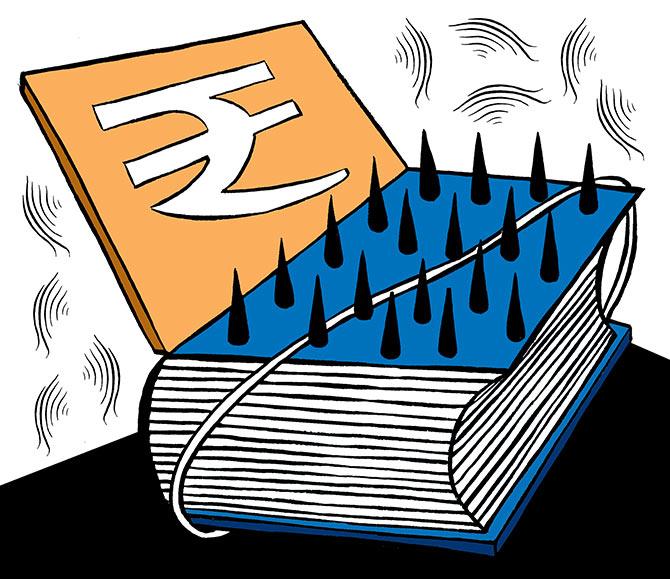'The intention of the government is to bring back the economic growth trajectory and this could be achieved not just by rate cuts but by pragmatic rate rationalisation and improved compliances.
'Pragmatic rate rationalisation will help in the fiscal discipline in the upcoming critical months when the economy will need a push.
'Time has come to monitor empirically the buoyancy and elasticity of the tax system,' says Abhishek A Rastogi.
Illustration: Uttam Ghosh/Rediff.com

Volatile tax collection has been a cause of great concern for the government after the implementation of the Goods and Services Tax (GST).
The September 2019 collection has hit a dismal low.
Apart from an economic slowdown, there are multiple other factors behind low revenue collection.
Tax conformance and financial discipline among businesses have a major role to play in revenue yield.
The government has taken a slew of corrective measures to improve GST collection.
Most of the teething GST issues have been resolved.
The GST Council has been persistently making commendable efforts to resolve new issues, simplify the compliance process and ease businesses into the new tax regime.
It is time for businesses to focus on streamlining tax compliance and address GST issues pragmatically.
While the revenue intelligence and the anti-evasion wings of the government have been actively taking actions against non-compliance or evasion, the government could consider restructuring tax investigating authorities in specific industry groups/segments so that they can understand the industry better and take informed decisions after appreciating the unique hardships faced by an industry.
Large businesses are expected to co-operate with these investigations and comply with justified demands/suggestions from tax authorities.
The government should also closely monitor whether large businesses are passing on the commensurate benefit of reduced GST rates and increased input tax credits through the anti-profiteering mechanism.
The industry must also take timely advantage of various tax amnesty schemes extended by state and central governments.
Tax certainty plays a key role in improving the ease of doing business and attracting more investments.
The advance ruling authorities constituted under the GST laws play a crucial role in providing valuable guidance to corporations in structuring their business from a tax planning perspective.
However, a slew of rulings from the advance ruling authorities across the country reflect a high pro-government bias resulting in mostly unfavourable decisions for businesses.
Accordingly, businesses are gradually losing hope of a fair assessment from these authorities.
Under such circumstances, true “tax certainty” in business is hard to come by.
The government must consider putting in place a judicial scrutiny of decisions given by advance ruling authorities.
Such judicial scrutiny should be done by non-revenue officers.
The repercussions of a global slowdown cannot be entirely avoided despite India growing comparatively fast.
The GST Council must be commended for taking pragmatic actions that can give an impetus to domestic consumption.
Tax rates on various FMCG products and consumer goods are also seeing a steady decline.
The last few GST Council meetings, have resulted in significant tax sops for the real estate and the hospitality sectors.
The auto industry is also expected to receive some respite from the government, considering the sectoral slowdown.
The government expects the rich to shell out taxes at a higher rate on the purchase of luxury vehicles as a person buying a luxury car can reasonably afford the highest rate of tax.
It is now time for the government to seriously think about rate rationalisation vis-à-vis fiscal deficits.
The 2.67 per cent decline in revenue collection may not be directly proportional to the slowdown as there could be various other factors such as low compliance.
For instance, the actual amount of the refunds sanctioned will have to be seen to determine the reduction of the GST collections.
It is time the government starts assessing performance of a commissionerate under the “tax throughput” concept which recognises the efforts of officers not only by tax collections but also by refunds sanctioned.
The level of compliances will have to be checked and compared with last year before arriving at any conclusion.
Due to the upcoming festive season, there could be improved tax buoyancy in the coming months.
A better way to look at the revenue collection is to see the aggregate of both the direct taxes and indirect taxes and the refunds granted towards both these taxes.
The intention of the government is to bring back the economic growth trajectory and this could be achieved not just by rate cuts but by pragmatic rate rationalisation and improved compliances.
Pragmatic rate rationalisation will help in the fiscal discipline in the upcoming critical months when the economy will need a push.
Time has come to monitor empirically the buoyancy and elasticity of the tax system.
Abhishek A Rastogi is partner at Khaitan & Co.











